The Dictatorship
RFK Jr.’s ignorance is bad. But he’s not who keeps me up at night.
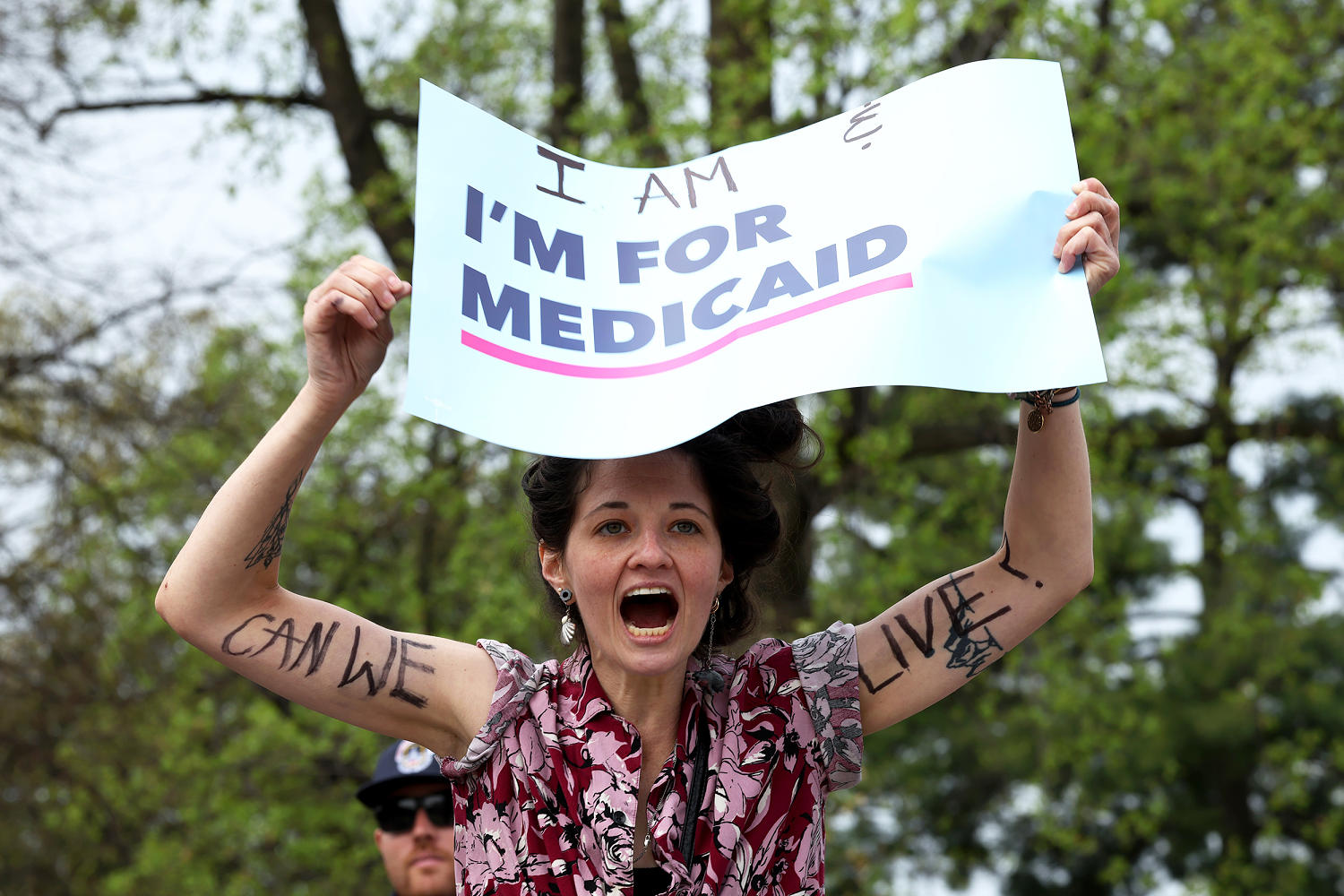
April 2025 was the weirdest Autism Awareness Month in my life, thanks largely to Robert F. Kennedy Jr.
The secretary of health and human services finished the month as he began it: spreading conspiracy theories, misinformation and lies about autismvaccines, basic medical theories and more. He promised a study that would find the causes of autism by September (a timeline his NIH director immediately abandoned). He threatened to form a registry of autistic people, then pulled back, but not before parents began canceling assessments out of fear of what the government might do with that information. And in an interview with Dr. Phil, he not only offered more false links between vaccinations and autism, but also chemtrail conspiracy theories and an insistence that parents considering vaccinating their kids should “do their own research.”
That’s plenty of “awareness” — the wrong kind of awareness. I need families like mine — my 18-year-old son is autistic — and those who care about us to become aware of the threats against Medicaid. I need awareness of the consequences that proposed GOP cuts would exact on families like mine, and what we can do to stop or mitigate the coming disaster.
If Medicaid gets cut, states are going to have to make decisions.”
Zoe Gross, director of advocacy at the Autistic Self Advocacy Network
I don’t know that we can stop Kennedy from saying ignorant and stigmatizing things, but we can’t spend the next four years chasing down and debunking a man who literally doesn’t believe in germ theory. But the Republican-controlled Congress, backed by the president, is planning radical cuts to Medicaid, and there’s nothing more important for autistic people, their families and everyone with any disability or a loved one with a significant disability in America.
Zoe Gross, director of advocacy at the Autistic Self Advocacy Networksays it’s been the “most intense April” for her in terms of media advocacy, with the need to refute public statements from the Trump administration, address community panic around the “registry” and more. But the time spent just trying to bat back the worst statements comes with a cost. “What we’re missing,” she told me, “is looking at the practical needs of autistic people in the U.S., how they can be met, and the government’s role [in meeting them].”
She’s worried because the administration is “trying to take hundreds of millions of dollars out of Medicaid” and there’s no way to do that without cutting back on Home and Community Based Services (HCBS), which allow autistic people to live independently and prevent family members from having to leave the workforce to care for their loved ones. Right now, recipients of HCBS have their needs assessed, then get assigned a number of hours of support based on that assessment — already a highly contested and stressful practice.
“If Medicaid gets cut, states are going to have to make decisions,” Gross says. “One thing they could do is cut people’s hours. People will be stuck in apartments, in wheelchairs, unable to bathe, dress, go to the bathroom.” People who rely on support professionals to get them to and from work, to grocery shop, to function as highly independent members of society will lose that independence. People who need 24/7 care may be forced into institutions, or family members will have to leave the workforce to provide care at home.
My son is autistic and needs a responsible adult around at all times. He also has Down syndrome, is intellectually disabled, and is nonverbal but a great communicator. I always worry that accurately describing his support needs will wrongly convey the idea that he’s a burden. He just requires specific kinds of supports. They aren’t really that expensive and are pretty easy to provide. Medicaid supplies him health care, an aide who allows him to access the world in the same ways that other teenagers doand access to therapeutic programs not otherwise covered in school.
Many Americans who rely on Medicaid, or love someone who does, don’t even know it.
As he grows older, HCBS will enable him to be supported while living at home (with us!) or in some other community context — if HCBS survives this budget process, that is. The other options are: institutionalization, which we won’t do (though others’ medical circumstances may warrant shifting to residential care), or a family member providing all the daily support without sufficient state assistance.
Our situation isn’t atypical, but one problem is that many Americans who rely on Medicaid, or love someone who does, don’t even know it. States administer Medicaid under many different state-based program names, and users often don’t know their state program is, in fact, Medicaid. One person who might help ensure people know this would be, of course, the secretary of health and human services. But at his confirmation hearingsalas, Kennedy seemed not to know anything about the $800 billion program.
Autism Awareness Month began in 1970and there have been both upsetting, divisive and downright weird months before. We’re always a divided communitywith splits among autistic people, among parents (many of whom are autistic, others of whom perpetuate the worst stereotypes about autism as epidemic), and between family and self-advocate communities. April can exacerbate such divisions, sadly, even without Kennedy perpetuating horrific stereotypes. Increasingly, the autistic community focuses on autism “acceptance” rather than awareness, because acceptance is an actionsomething each of us can, and must, do.
But Gross says that maybe this once, awareness might help. “If there’s increased awareness of autism this month, that’s great,” she said, “[because] we want you to be aware of the precarious situation of Medicaid right now. We depend on it for daily survival.”
The Dictatorship
Zohran Mamdani’s modest grocery proposal has sparked a right-wing panic for no reason

The Democratic nominee for mayor in New York City Zohran Mamdanihas commanded a share of the nation’s attention that few candidates for local office will ever achieve. Many of the controversies swirling around him have at least centered on issues that always inspire heated debate, like the Israeli/Palestinian conflict. Since his victory in the primary, though, a surprising number of denunciations of Mamdani by conservatives and libertarians have centered around … grocery stores.
Writing in The Wall Street Journal, John Catsimatidis (who owns the grocery store chains Gristedes and D’Agostino’s) warned that Mamdani’s policies on grocery sales amount to “radical socialism” and, if implemented, “would collapse our food supply, kill private industry, and drag us down a path toward the bread lines of the old Soviet Union.” The same analogy was pursued by Megan McArdle in The Washington Post. “Forget the old-school communist talk about socializing the means of production,” McCardle wrote. “Mamdani wants to socialize the means of consumption.”
A surprising number of denunciations of Mamdani by conservatives and libertarians have centered around … grocery stores.
Judging by these reactions, you’d think that Mamdani had, at the very least, proposed expropriating every privately owned supermarket and bodega in the city and placing them under control of a People’s Commissariat of Food Supply. You might even wonder if he’d gone further and proposed sending the NYPD to conquer some rural areas of upstate New York and forcibly collectivize agriculture there.
In reality, he’s proposed a very modest experiment. He doesn’t want to touch a single privately owned store. Instead, he wants to start five new city-owned grocery stores, one in each of the five boroughs, designed to provide a public option for grocery shopping in the areas within those boroughs with the fewest private options (where grocery prices at those few stores that do operate tend to be very high).
If this sounds like an extreme proposal, it shouldn’t. There are 17 states around the country with public monopolies on liquor stores. One of these is the most otherwise libertarian state in the union, New Hampshire, whose state motto is “Live Free or Die.” If the 80 state-owned liquor stores in New Hampshire don’t inspire hysterical analogies to the Soviet Union, despite the lack of private competitors, introducing a grand total of five private groceries to New York City (whose population is almost eight times the total population of New Hampshire) shouldn’t either.
Billy Binion, a writer for the libertarian magazine Reason, argues that this is an analogy that should make us more skeptical of the idea, rather than less. After the end of Prohibition, he points out, some politicians in these states supported moving state monopolies on liquor stores because they “wanted drinking to be difficult and expensive after alcohol was legalized again.” As such, the analogy to food sales “isn’t exactly reassuring.”
But there’s a world of difference between why some prohibitionist dead-enders might have supported a policy in the 1930s and why it remains popular in the 2020s.
The difference between prevailing attitudes in different states also matters. Are we really supposed to believe that voters and politicians in “Live Free or Die” New Hampshire continue to support the state monopoly because they wish Prohibition would come back and, failing that, they want a nanny state to do everything it can to discourage drinking?
If so, the policy has been a truly spectacular failure. States are clustered together closely in that part of the country, and people from around the region often drive to New Hampshire for the sole purpose of stocking up on cheap liquor at the state liquor stores. Anyone who’s ever driven into the state will remember the giant billboards directing people to those stores. In fact, NPR reported several years ago that latter-day bootleggers are sometimes caught buying up hundreds of bottles of cheap New Hampshire liquor to resell in other states. Far from being a hotbed of neo-prohibitionism, New Hampshire keeps its liquor store policy in place precisely because it brings much-needed revenue to a state that’s notoriously reluctant to raise funds through taxation.
It’s a quirk of culture and history that publicly owned liquor stores are so much more common in capitalist countries than publicly owned stores selling milk and eggs, but on a basic logistical level, a city-owned grocery store in Queens would be much more like a state-owned liquor store in New Hampshire than it would be like a Soviet grocery store. Aside from John Catsimatidis and Megan McCardle, I’ve never heard anyone suggest that the reason shelves were so often empty at Soviet stores was because the stores themselves didn’t know how to order needed goods from suppliers or stock the shelves, rather than the problems with making sure the actual production of goods was coordinated with fine-grained consumer preferences in a system where every aspect of the economy was centrally planned.
Perhaps, given the smaller profit margins in stores selling perishable groceries than stores selling beer, wine and hard liquor, though, Mamdani’s proposed experiment with a tiny number of municipal grocery stores would be a failure and it would have to be abandoned. There’s no way to be certain before it’s tried.
New Hampshire keeps its liquor store policy because it brings much-needed revenue to a state that’s notoriously reluctant to raise funds through taxation.
What I can’t get over, though, is the massive contradiction at the heart of the right-wing panic about his proposal. If the shelves would be empty since no public employee could ever navigate the delicate logistical hurdles, why on earth would anyone shop there rather than finding a private alternative? But if so, how are we supposed to understand the claim in the Wall Street Journal op-ed that Mamdani wants to “replace” private with public grocery stores? Is the problem that any city-owned grocery stores would be horrendously inefficient, such that we’d see empty shelves to the Leningrad in 1970? Or is it that they’ll be so wildly successful that the initial experiment with five stores will mushroom and all private competitors will eventually be put out of business?
Neither criticism is especially compelling on its own. But if critics want to make any sense at all, they have to pick.
Ben Burgis is a political commentator and author. He has written articles for Jacobin and The Daily Beast.
The Dictatorship
The lie Republicans will use to sell punishing megabill cuts to MAGA voters

When President Ronald Reagan was trying to justify massive cuts on social programs, he would often invoke the so-called welfare queen.
His rhetoric focused on an imaginary American — typically assumed to be a Black, single woman — who was living large on the public dole.
Today’s Republicans haven’t invoked the stereotype as they’ve set about slashing the safety netbut that may be because they don’t have to.
There’s a persistent myth in American politics that poverty has a single face and that face is usually Black, often female, and somehow responsible for her own hardship.
The Senate voted to pass the “big, beautiful bill” on Tuesday. The House, after wavering for a few hours on Wednesday nightis now poised to send it to President Donald Trump’s desk in time for his Fourth of July deadline. But even as Trump and his allies in Congress have prepared to take food off the tables of poor Americans with their megabillthe decades-long project to demonize social welfare programs has helped them avoid accountability.
And make no mistake, the people that many of these cuts are going to hurt the most are the white, rural voters who backed Trump in the last three elections.
There’s a persistent myth in American politics that poverty has a single face and that face is usually Black, often female, and somehow responsible for her own hardship.
That myth was not born by accident. It was crafted, polished and weaponized. It was built on decades of policy choices and political messaging that added racial overtones to programs designed to combat poverty among all Americans in an effort to erode public support.
Ironically, these programs began as ways to help poor white people. When the New Deal began tackling poverty, programs such as Aid to Dependent Children (later renamed Aid to Families with Dependent Children, AFDC) were designed to support mostly white, widowed mothers suffering in the Great Depression.
It wasn’t until the Civil Rights Movement gained traction in the 1960s that more Black families became able to access these same benefits. That led to a backlash against them that the right has long used to try to undercut them.
By the 1970s, amid rising inflation, economic anxiety and racial resentment, conservatives began to cast what was known as “welfare” not as a ladder out of poverty but as a trap and its recipients as ungrateful, unproductive burdens on the system.
Reagan took a story about a real woman convicted of fraud and exaggerated it into the fictional ‘welfare queen.’
That set the stage for Reagan, who took a story about a real woman convicted of fraud and exaggerated it into the fictional “welfare queen” who was supposedly cashing multiple checks under multiple names and driving a Cadillac.
The strategy worked. The “welfare queen” myth gave policymakers from both parties permission to strip benefits from millions of people.
When President Bill Clinton signed the 1996 welfare reform bill, officially ending AFDC and replacing it with Temporary Assistance for Needy Familiesthe damage was codified. Clinton promised to “end welfare as we know it,” and he did. But what also ended was any real commitment to a guaranteed safety net in this country.
The truth is, the majority of people living in poverty in America today are not Black. They are white, rural Americans, children and veterans. They are seniors on fixed incomes or single mothers juggling multiple jobs and still coming up short. The face of poverty is not who many Americans have been conditioned to see.
The cost of that conditioning is showing up in real time.
Last month, House Republicans advanced a tax bill that would give about $4 trillion in permanent tax breaks to the wealthy and big corporations over the next 10 years. And earlier this week, the Senate passed a revised version of that bill that would lock in those tax cuts that overwhelmingly help the rich. How do they plan to pay for it? By targeting the very programs that keep working people afloat — like SNAP and Medicaid. This isn’t fiscal responsibility. It’s cruelty disguised as economics.
Democratic Rep. Brendan Boyle of Pennsylvania joined us on “The Weeknight” earlier this week to make this very point. He reminded viewers that there are two counties in Pennsylvania that are directly tied for the highest poverty rate. One is in Philadelphia and the other is Fayette County, which is along the border of West Virginia and 95% white. That truth rarely gets its deserved airtime, yet it is central to the stakes of this moment.
Vague political language like “spending cuts,” “entitlement reform” and “deficit reduction” allow harmful assumptions to do the dirty work.
Vague political language like “spending cuts,” “entitlement reform” and “deficit reduction” allow harmful assumptions to do the dirty work. It keeps people from realizing that when Congress cuts SNAP, they’re not punishing a stereotype. They’re punishing real people. The single mother in Appalachia. The retiree in Arizona. The family in Detroit living paycheck to paycheck.
Many of them are Trump voters, including both his die-hard supporters and those who say they were fed up with inflation and looking for change last November.
They will soon suffer from these cuts, too. So why did they vote against their own interests? Because they’ve been sold a story, one that says that the “takers” are Black and brown and implicitly promises that the pain will be inflicted on someone else. One that allows some people in poverty to think that they’re the virtuous ones who are being held back and that the cuts will only affect the “waste, fraud and abuse” coming from somewhere else.
The truth will become clear soon enough. Some of these voters may come to realize they’ve been sold a bill of goods. Let’s hope that the horrific effects of this legislation eventually cause a moment of reckoning for the people who continue to try to sell the lie of the “welfare queen” to justify their own cruelty.
For more thought-provoking insights from Michael Steele, Alicia Menendez and Symone Sanders-Townsend, watch “The Weeknight” every Monday-Friday at 7 p.m. ET on BLN.

Symone D. Sanders Townsend is an author and a co-host of “The Weeknight,” which airs Monday through Friday at 7 p.m. ET on BLN. She is a former deputy assistant to President Joe Biden and a former senior adviser to and chief spokesperson for Vice President Kamala Harris.
The Dictatorship
‘Rip food from the mouths of hungry children’: Leader Jeffries rips bill during House debate

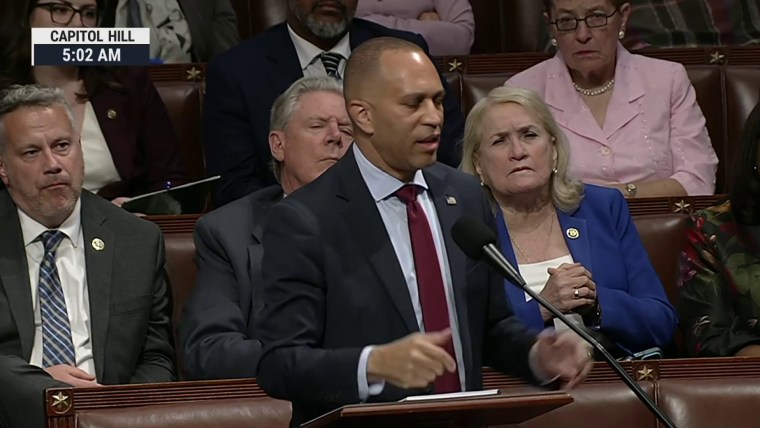
-
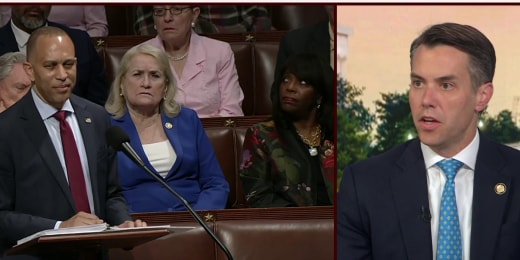
‘A complete slap in the face’: House Democrat rips Trump spending bill
05:17
-
Now Playing

-
UP NEXT

Donalds announces $22 million haul since running for Florida governor
05:36
-
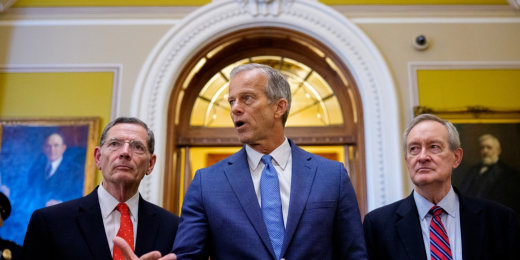
‘A terrible bill’: House Democrat says party will communicate impact of Trump bill
06:33
-

Trump intensifies attacks on Fed Chair Powell
05:34
-
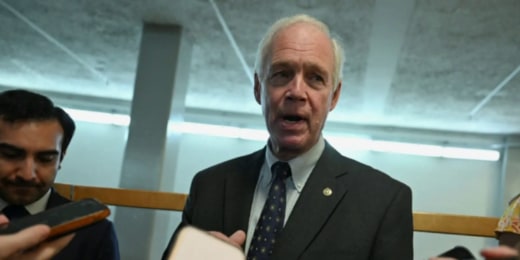
Senate Republicans emerge divided from megabill briefing
05:56
-

State lawmakers warn of lack of personal security
05:29
-
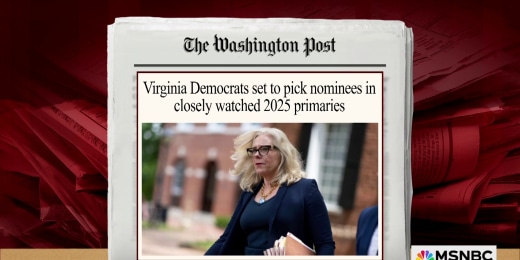
Virginia holds primary election Tuesday
05:51
-

Trump orders ICE officials to ramp up deportation efforts in Democrat-run cities
05:52
-

Suspect in Minnesota lawmaker’s killing is captured
03:36
-

‘He was manhandled’: Democratic strategist reacts to senator’s removal from news conference
08:00
-
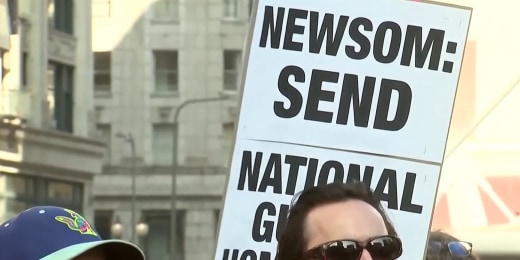
California mayors call for end to federal immigration raids
08:34
-
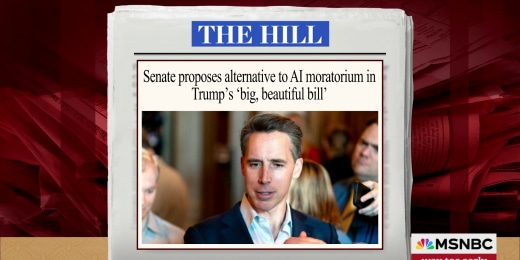
GOP bill would protect AI companies from lawsuits if they offer transparency
05:43
-

Plane crashes near major Indian airport with more than 200 people on board
00:32
-
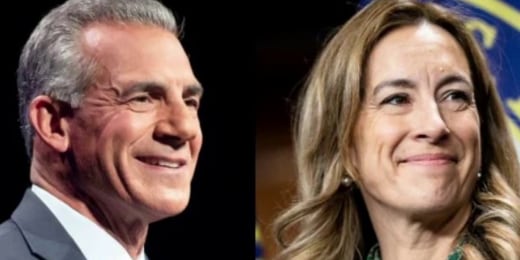
New Jersey governor’s race is set as Mikie Sherrill and Jack Ciattarelli win their primaries
04:16
-

‘Authoritarian power grab’: House member reacts to Trump’s use of military ‘as a police force’
06:28
-

‘My constituents are very scared’: House member on ICE arrests
07:41
-
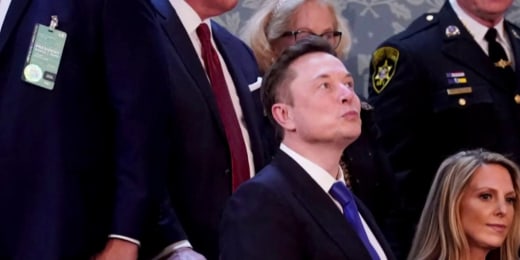
Trump says Elon Musk will face ‘very serious consequences’ if he funds Democratic candidates
06:01
-
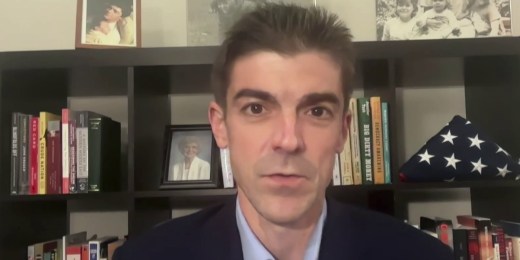
Former federal prosecutor announces candidacy for Congress
06:04
-

Trump orders investigation of Biden and his aides
09:05
Way Too Early
-

‘A complete slap in the face’: House Democrat rips Trump spending bill
05:17
-
Now Playing

‘Rip food from the mouths of hungry children’: Leader Jeffries rips bill during House debate
10:13
-
UP NEXT

Donalds announces $22 million haul since running for Florida governor
05:36
-

‘A terrible bill’: House Democrat says party will communicate impact of Trump bill
06:33
-

Trump intensifies attacks on Fed Chair Powell
05:34
-

Senate Republicans emerge divided from megabill briefing
05:56
-

 The Josh Fourrier Show8 months ago
The Josh Fourrier Show8 months agoDOOMSDAY: Trump won, now what?
-
Uncategorized8 months ago
Bob Good to step down as Freedom Caucus chair this week
-

 Politics8 months ago
Politics8 months agoWhat 7 political experts will be watching at Tuesday’s debate
-

 Politics8 months ago
Politics8 months agoHow Republicans could foil Harris’ Supreme Court plans if she’s elected
-
Economy8 months ago
Fed moves to protect weakening job market with bold rate cut
-
Economy8 months ago
It’s still the economy: What TV ads tell us about each campaign’s closing message
-

 Politics8 months ago
Politics8 months agoRFK Jr.’s bid to take himself off swing state ballots may scramble mail-in voting
-
Uncategorized8 months ago
Johnson plans to bring House GOP short-term spending measure to House floor Wednesday







